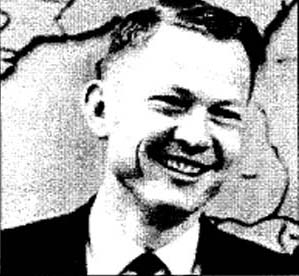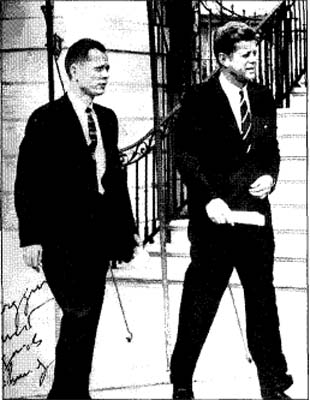
In 1961, Mr. Wiggins, who became one of the top leaders of the high-profile agency in its earliest years, was an unknown foreign policy adviser whose brief paper, "The Towering Task," landed in the lap of the Peace Corps' first director, R. Sargent Shriver, just as he was trying to figure out how to turn President John F. Kennedy's campaign promise into a working federal department. The response to it became legendary in the agency as "the midnight ride of Warren Wiggins." Shriver, burrowing through correspondence shortly after midnight on Feb. 6, 1961, was electrified by the treatise, which urged the agency to act boldly. A small agency was more likely to fail because its projects would not be consequential enough, Mr. Wiggins wrote. Using specific examples, with a proposed staff size and budget, Mr. Wiggins suggested that Kennedy act through an executive order for the quickest start. "Shriver from the beginning saw him as someone who had the spirit of moving big and fast," former senator Harris Wofford (D-Pa.), who was there, said in an interview. "The Peace Corps, small and symbolic, might be good public relations, but a Peace Corps that was large and had a major impact on problems in other countries could transform the economic development of the world."
Obituary for Warren Wiggins, Architect of the Peace Corps
Warren W. Wiggins; Bold Treatise Shaped Peace Corps' Mission
By Patricia Sullivan
Washington Post Staff Writer
Sunday, April 15, 2007; Page C07
Caption: Warren Wiggins in 1966.
Warren W. Wiggins, 84, the major architect and organizer of the Peace Corps who wrote the basic philosophical document that shaped its mission, died of atypical Parkinson's syndrome April 13 at his home in Haymarket.
In 1961, Mr. Wiggins, who became one of the top leaders of the high-profile agency in its earliest years, was an unknown foreign policy adviser whose brief paper, "The Towering Task," landed in the lap of the Peace Corps' first director, R. Sargent Shriver, just as he was trying to figure out how to turn President John F. Kennedy's campaign promise into a working federal department.
The response to it became legendary in the agency as "the midnight ride of Warren Wiggins." Shriver, burrowing through correspondence shortly after midnight on Feb. 6, 1961, was electrified by the treatise, which urged the agency to act boldly. A small agency was more likely to fail because its projects would not be consequential enough, Mr. Wiggins wrote. Using specific examples, with a proposed staff size and budget, Mr. Wiggins suggested that Kennedy act through an executive order for the quickest start.
Shriver fired off a telegram at 3 a.m., directing Mr. Wiggins to appear later that morning at the Mayflower Hotel, where he had his office.

Caption: Warren Wiggins and President Kennedy.
When Mr. Wiggins appeared, he was astonished to find that his exposition had been mimeographed and distributed to Shriver's task force. According to the 1994 work "A History of National Service in America," Shriver ordered everyone to read the paper, then said it came closer to expressing his views than anything he had seen.
"Shriver from the beginning saw him as someone who had the spirit of moving big and fast," former senator Harris Wofford (D-Pa.), who was there, said in an interview. "The Peace Corps, small and symbolic, might be good public relations, but a Peace Corps that was large and had a major impact on problems in other countries could transform the economic development of the world."
At the time, Mr. Wiggins was a 38-year-old deputy director of Far East operations in the International Cooperation Administration, just the sort of bureaucrat the new administration disdained. But he was no stereotype; he was "totally dissatisfied with the manner in which American overseas programs were run," wrote John Coyne, a historian of the Peace Corps.
Mr. Wiggins never went back to the ICA. Three weeks later, the Peace Corps was born, by executive order.
Mr. Wiggins, a native of Phoenix, left the University of Colorado to serve in the Army Air Forces during World War II. He flew transport planes "over the Hump" in the China-India-Burma theater and received a Distinguished Flying Cross.
After the war, he finished college in Colorado, then received a master's degree in economics from Harvard University in 1949. He served two years on the staff of the Marshall Plan in Norway, then worked for the Eisenhower administration, coordinating economic programs in Western Europe. He then worked for the ICA in the Philippines and Bolivia.
As associate director of program development for the Peace Corps, Mr. Wiggins was at a White House meeting when Kennedy's aides decided that the fledgling agency should report through the established foreign policy bureaucracy. Mr. Wiggins, alarmed, fired off a cable to Shriver, who was overseas. Mr. Wiggins then asked Bill Moyers, deputy director of the Peace Corps, to take a copy of the cable to Vice President Lyndon B. Johnson and argue the political benefits of an independent Peace Corps. Johnson agreed, addressed the matter with Kennedy, and the decision was reversed.
Mr. Wiggins said the State Department's system of overseas assignments had "tended to squeeze the juices out of a man so he could be packed, preserved and shipped about like a dried apricot." His agency, in contrast, wanted volunteers who would live with residents, frequent local stores and learn the language. "This goes for Thai and Bengali as much as for French and Spanish. The idea that a staff member should polish French, the language of diplomacy, rather than tackle a difficult Asian tonal tongue is an idea we do not buy," he said in 1963.
Mr. Wiggins later served as deputy director of the Peace Corps. He left in 1967 to form TransCentury, a private firm that ran a job center in Anacostia and a remedial education program in New York. During the District's 1968 riots, the TransCentury building at 1520 Seventh St. NW was the only one on the block spared from arson and vandalism.
"It's hard to say exactly why we weren't touched," he said at the time. "It's partly luck, partly because we don't have any enemies and partly because we think we do have some friends on the block. . . . The people in the area know the kind of work we do."
The company closed in 1995, and Mr. Wiggins devoted himself to poetry, sketching and tending his garden, growing persimmons and many vegetables.
Survivors include his wife of 63 years, Edna Abell Wiggins of Haymarket; six children, Bill Wiggins of Livermore, Colo., Karen Wiggins Dowler of Pacifica, Calif., Lisa Ann Wiggins of Port Angeles, Wash., John Reed Wiggins and David Wiggins, both of Haymarket, and Mark Wiggins of Pacific Grove, Calif.; five grandchildren; and six great-grandchildren.
"I think he embodied the watchwords that were once given to me: We must be more inventive if we're going to do our duty," Wofford said. "He was ever inventive. He was putting his mind to problems. . . . Warren was not somebody to rest content with falling short. He was ever ready for the quantum leap."
















